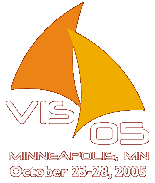


 |
|
|
  |
||
| Workshops Submissions are solicited for workshops related to all areas of visualization. The workshops will provide an informal setting for participants to discuss advanced technical topics in visualization, involve experts in the field, allow for dissemination of work in progress, and promote new ideas. Workshops should be designed to complement, not compete with, the mission of Visualization and InfoVis 2005. Workshops this year are targeting two types of organizational styles:
Workshop focus-group meetings should emphasize emerging ideas, concepts, or technologies that are currently too nascent or too interdisciplinary to merit a full symposia yet. Workshop coordinators should be prepared to report to the full conference the success of the meeting, a report of the status of the emerging topic, and a recommendation for how the participants and organizers hope to proceed in future years. Work-session style workshops are intended to generate a work product: to write a new report, to work-up formative ideas, or to prepare a white-paper or proposal. Submissions for such workshops should describe what work product is intended and its expected impact and focus. A distinction that separates workshops from tutorials and/or symposia is that the information flow for a workshop should not be directed solely from the presenters to the audience, but should engage the participation of all the attendees in the development of particular ideas or issues. Reports of the results from the workshops will be presented during a session of the conference. Papers submitted and presented as part of a workshop will not be published in the proceedings of the conference. Workshop materials may be published as part of the electronic proceedings on the conference DVD, subject to approval of the electronic publications chair. If you wish to have your materials considered for printed publication, please submit the paper to the main conference or the related symposia. Proposals should be submitted to Terry Yoo at yoo@nlm.nih.gov. Proposals should include the title, goals, technical scope, planned activities, and length (full or half day). The mission or proposed focus and impact of the workshop results should be stated, as well as a statement of the organization and development of the list of participants (how large is the intended workshop? how are participants selected?). In addition, organizers should describe any other relevant considerations for the workshop including: the organization of facilities (room setup as a round table? Lecture theater? or in a Panel format?); also the proposal should include arguments for other considerations such as the inclusion of workshop materials in the conference DVD. Organizers should also provide a brief description of their background, and related publications and research. For more information, please contact any of the Workshop Chairs, Terry Yoo at yoo@nlm.nih.gov, John Dill at dill@cs.sfu.ca, or Ken Martin at ken.martin@kitware.com. Deadline: Proposals must be submitted by June 30, 2005. 2005 Workshop proposals can be submitted at any time for early consideration and early decisions. |
|||||||||
|
|